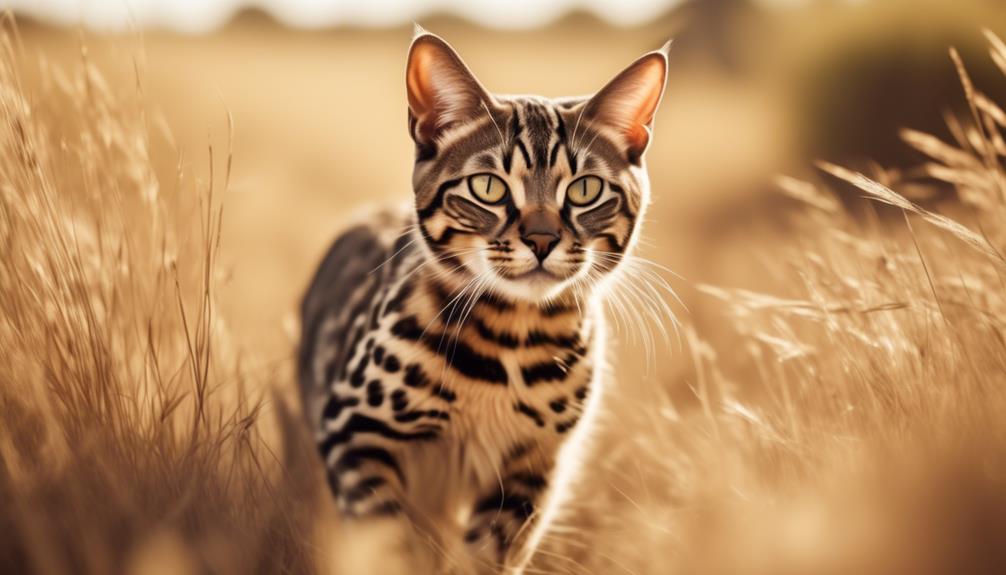
Welcome to our comprehensive guide on Serengeti mixed cat breed information and characteristics.
If you’re intrigued by the allure of a domestic cat resembling the majestic Serval wild cat, then the Serengeti might be the breed for you.
From its origin story to its unique coat pattern and compatibility with families and other pets, we will explore all aspects of this fascinating breed.
But that’s not all – we will also provide valuable insights into their size, personality, shedding amount, and adaptability to different climates.
So, if you’re curious to discover more about the Serengeti, keep reading to uncover the secrets of this extraordinary feline breed.
Key Takeaways
- The Serengeti is a medium-sized domestic shorthair cat breed with a distinctive spotted coat pattern.
- They are known for being affectionate, playful, and easy to train with their family.
- Serengetis are generally healthy but may be prone to genetic health conditions, so regular veterinary checkups are essential.
- They are adaptable to different climates and usually get along well with children and other household pets when properly socialized.
Origin and Size
The Serengeti cat breed, originating from the United States, is known for its medium size and distinctive spotted coat pattern.
Developed in the 1990s by Karen Sausman, the breed was intended to resemble the wild Serval cat and raise awareness for wildlife conservation.
Recognized by the International Cat Association (TICA), Serengetis have become famous for their unique appearance and playful personality.
They are medium-sized cats weighing 8 to 15 pounds, although size standards may vary.
Serengetis are intelligent, affectionate, and easy to train.
Their short, dense, sleek coat requires weekly brushing to prevent matting and hairballs.
While generally healthy, some Serengetis may develop genetic health conditions.
Regular veterinary checkups, proper care, and grooming are crucial for maintaining their well-being.
See another cat breed profile.
Serrade Petit Cat Breed
Breed Group and Lifespan
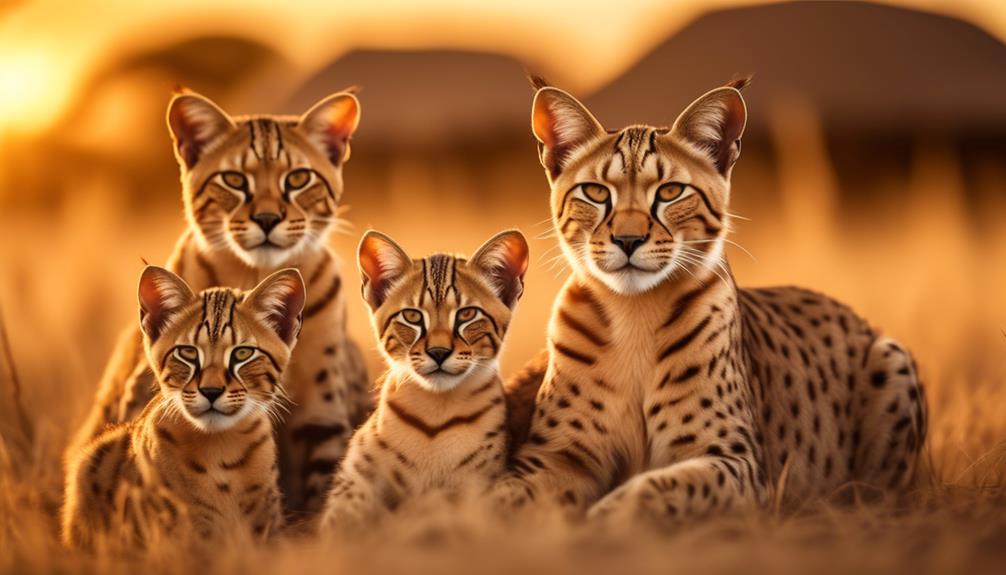
Originating in the United States and known for its distinctive spotted coat pattern, the Serengeti cat breed falls under the breed group of domestic shorthair.
It has an average lifespan of 10-15 years.
This breed group classification indicates that Serengetis share similar characteristics with other domestic shorthair cats.
They possess a short, dense, and sleek coat adorned with striking spots.
Serengetis are medium-sized cats weighing between 8 to 15 pounds.
They are intelligent, playful, and affectionate, making them easy to train and a joy to have as companions.
Despite their relatively short lifespan, Serengetis can bring their owners many years of joy and companionship.
Coat Description and Pattern
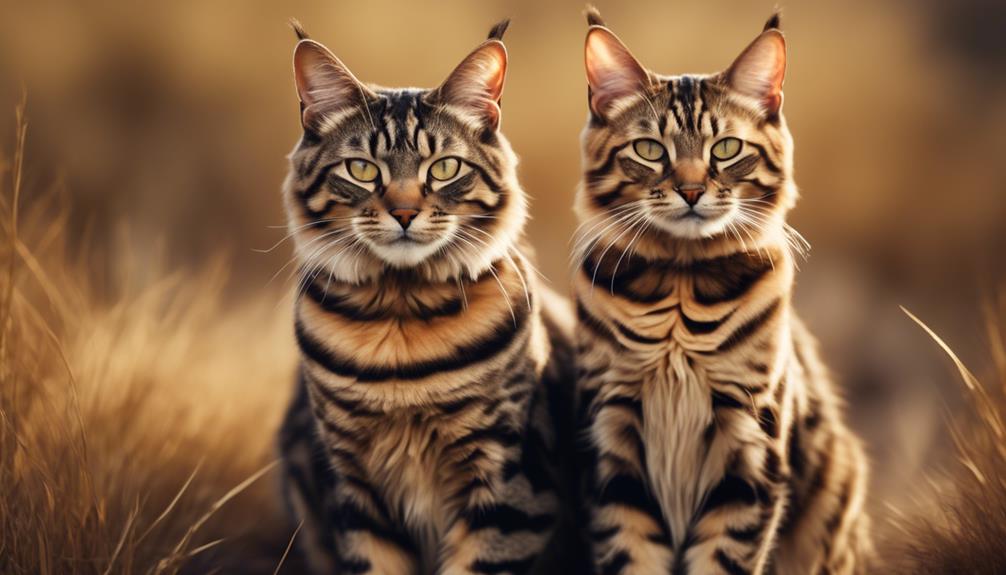
The Serengeti cat breed is known for its distinct coat description and pattern. Serengetis have a short, dense, and sleek coat that is easy to maintain.
The coat colors can vary, including shades of golden or gray with leopard-style spots.
These spots give the Serengeti a unique and exotic appearance, resembling the wild Serval cat.
The coat pattern is a result of careful breeding to resemble the beauty of the African plains.
The Serengeti’s low-maintenance coat only requires weekly brushing to prevent matting and hairballs.
This breed is adaptable to different climates but prefers slightly warmer temperatures.
Affectionate With Family
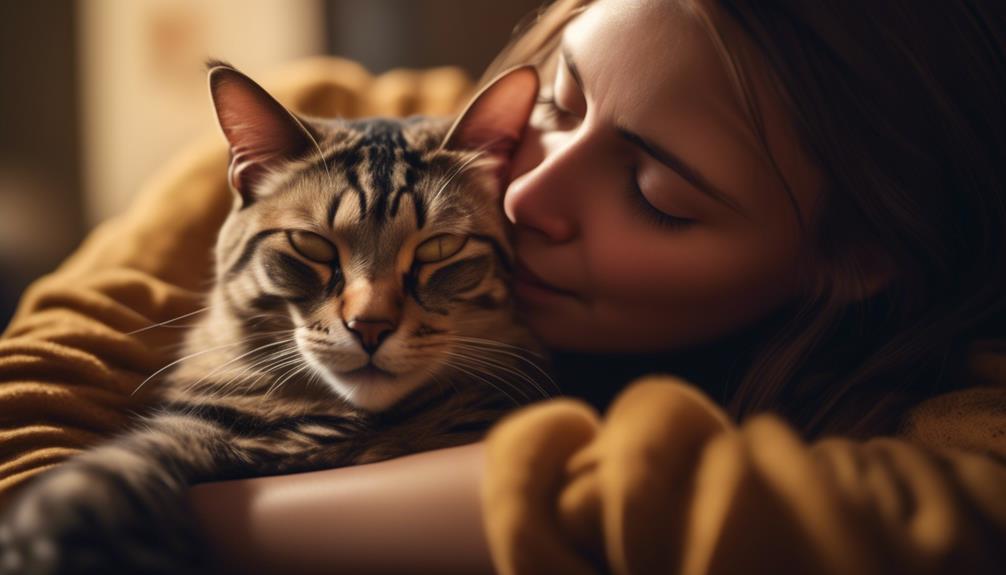
Moving on from discussing Serengeti’s distinct coat description and pattern, we now turn our attention to the ‘Affectionate With Family’ subtopic.
- Serengetis are known for their loving and affectionate nature towards their family members.
- They enjoy being around their owners and are often found cuddling or sitting close to them.
- Serengetis are loyal and form strong bonds with their human companions.
- They are social cats who thrive on human interaction and enjoy being part of family activities.
With their affectionate and loving disposition, Serengetis make wonderful family pets.
Their desire for human companionship and ability to form strong bonds with their owners contribute to their reputation as affectionate family cats.
Shedding Amount
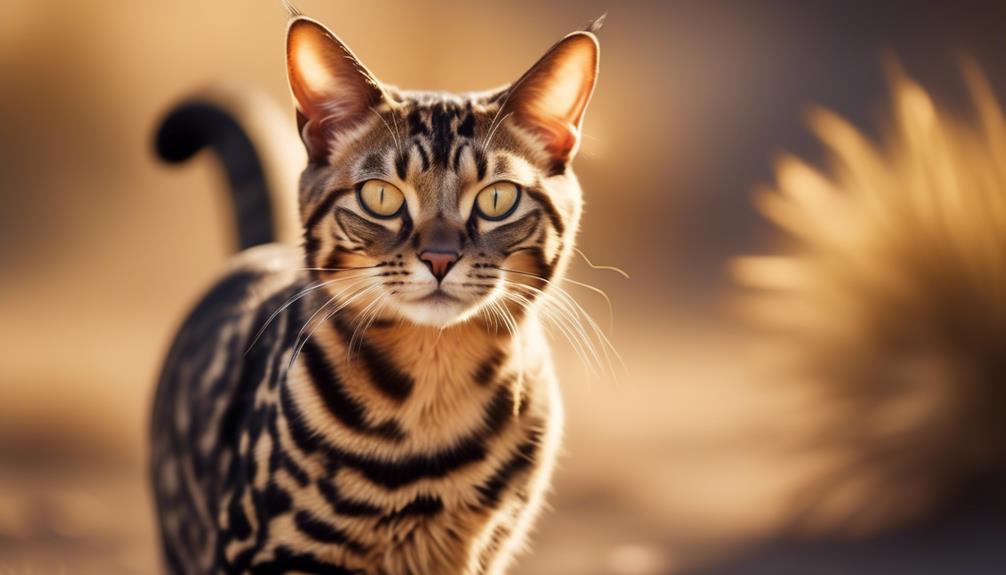
Serengetis are known for their moderate shedding tendencies. While they do shed, it is not excessive compared to other cat breeds.
Their short and sleek coat is low-maintenance and only requires weekly brushing to prevent matting and hairballs. This helps to keep shedding under control and maintain the coat’s healthy appearance.
Serengetis have a distinctive spotted pattern, which adds to their unique charm.
To give you a clearer idea of their shedding tendencies, here is a table outlining the shedding amount of Serengeti:
| Shedding Amount |
|---|
| Low |
| Moderate |
| High |
As you can see, Serengetis fall in the moderate shedding category, making them a suitable choice for individuals who prefer a cat breed with minimal grooming needs.
General Health
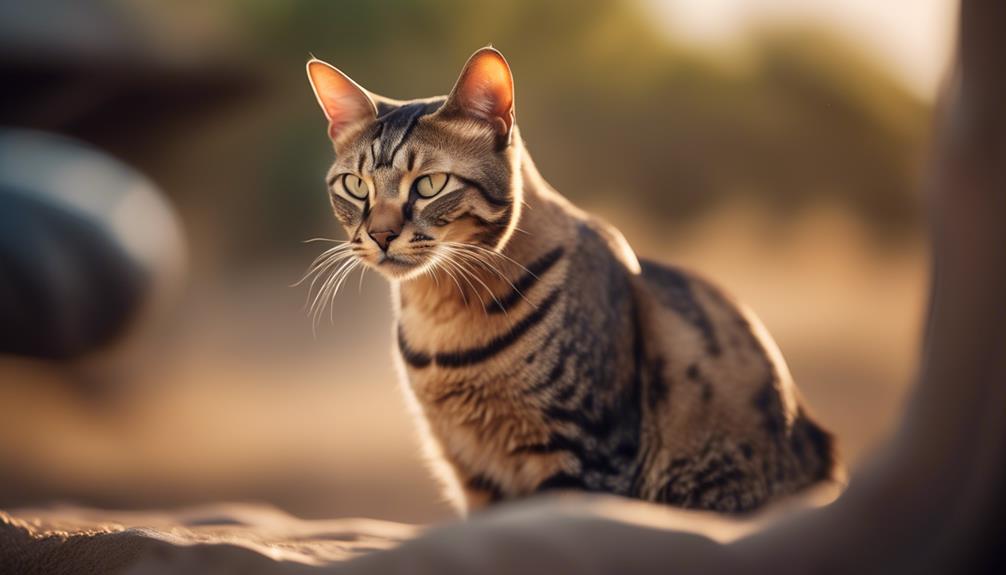
When considering the overall health of the Serengeti cat breed, it is essential to note that they are generally known to be robust and healthy.
Here are some key points to keep in mind regarding the general health of Serengeti cats:
- Regular wellness visits with a vet are essential to ensure their well-being.
- Serengetis do not have any breed-specific health problems.
- However, it is crucial to watch for signs of distress or pain.
- Providing enough space for them to run and climb, preventing feline obesity and boredom, is essential for their overall health.
Potential for Playfulness
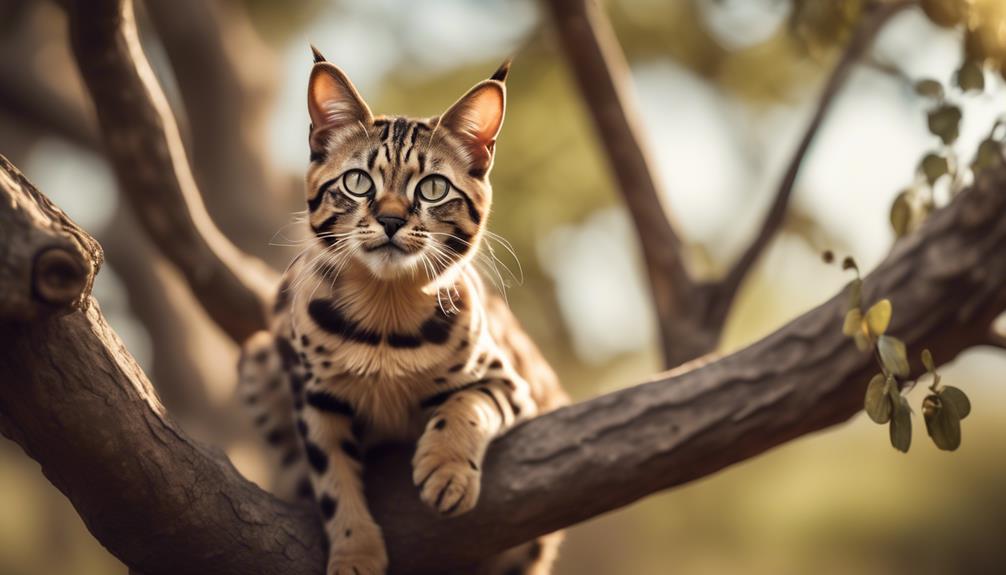
Considering the generally robust health of the Serengeti cat breed, exploring their potential for playfulness is essential.
Serengetis are known for their high energy levels and love for interactive play.
They possess an innate curiosity and enjoy exploring their surroundings, making them excellent playmates for children and adults.
These cats are intelligent and quick learners, quickly adapting to various playtime activities and games.
Their playful nature extends to their interactions with other pets, as they are generally amiable.
Engaging with interactive toys, such as puzzle feeders or feather wands, can provide mental stimulation and satisfy their natural hunting instincts.
Owners should ensure that Serengetis have plenty of opportunities for physical exercise and mental enrichment to keep them happy and entertained.
Tendency to Vocalize
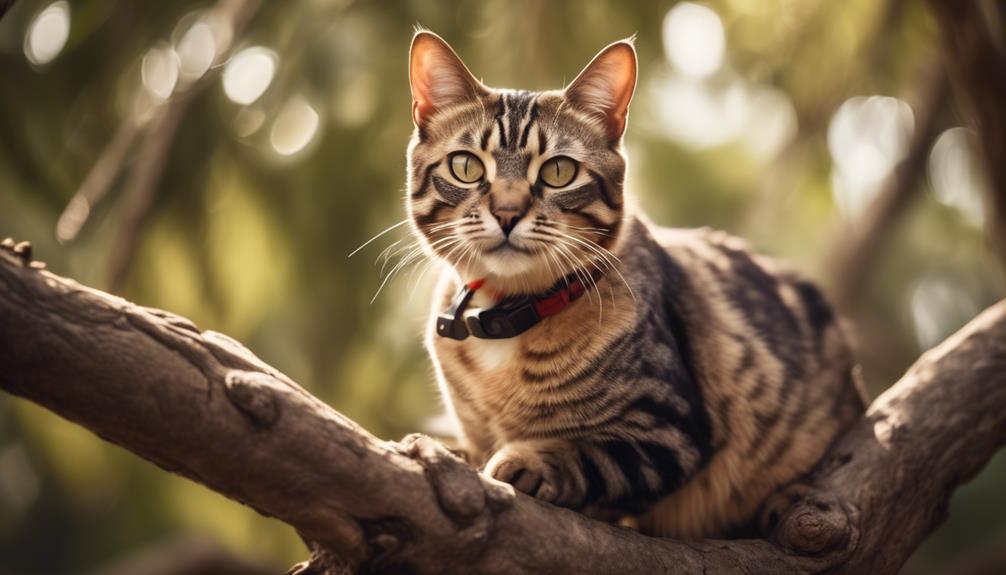
Serengeti cats are known to communicate vocally, expressing their needs and desires through various meows, chirps, and trills.
Their tendency to vocalize is one of their unique characteristics. Here are some key points about their vocalization:
- Serengetis use different types of meows to communicate with their owners, ranging from soft and gentle to loud and demanding.
- They may chirp or trill to express excitement or to get attention.
- Serengetis are known to be quite talkative and will often engage in conversations with their owners.
- Their vocalization is essential to establish and maintain their bond with their human companions.
With their expressive vocalizations, Serengeti cats clarify what they want and need, making them great communicators in the feline world.
History and Recognition
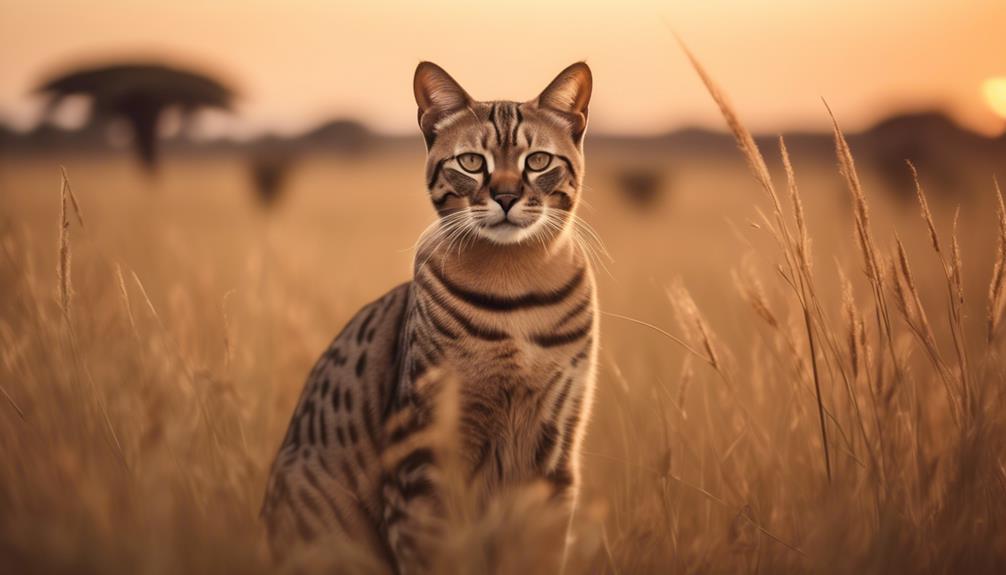
The Serengeti cat breed has a fascinating history and has gained recognition from the International Cat Association (TICA).
The Serengeti is a medium-sized cat weighing 8 to 15 pounds. Known for their intelligence, playfulness, and affectionate nature, Serengetis are easy to train and require weekly brushing for grooming.
While they are generally healthy cats, regular wellness visits with a vet are essential.
The breed has no specific health problems, but it is crucial to watch for signs of distress or pain and provide regular veterinary checkups.
Serengetis have a low-maintenance coat, with colors ranging from golden to gray and leopard-style spots. They are adaptable to different climates but prefer slightly warmer temperatures.
Size and Personality Traits
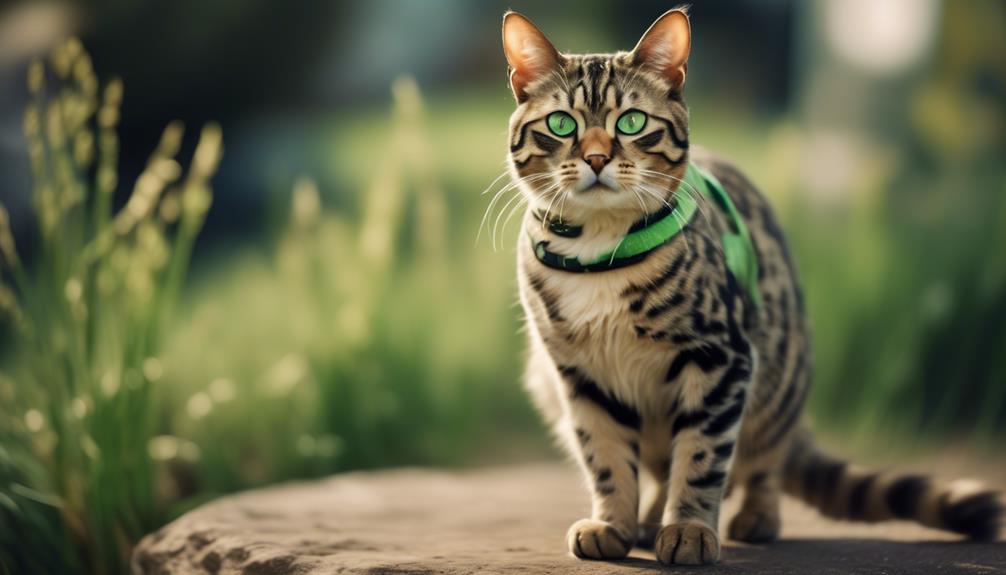
With a medium size and playful and affectionate personality, the Serengeti cat breed is known for its intelligence and easy trainability.
This breed makes a great addition to any household, especially for those looking for an interactive and lively companion.
Here are some key traits of the Serengeti cat breed:
- Active and playful nature: Serengeti loves to engage in interactive play and is always up for a game of chase or fetch.
- Affectionate and social: These cats enjoy spending time with their human companions and are known for their loving and cuddly nature.
- Curious and intelligent: Serengetis have a natural curiosity and are quick learners. They enjoy problem-solving activities and can be trained to perform tricks.
- Adaptability: Serengetis can easily adjust to different environments and are generally adaptable to changes in their surroundings.
Health, Care, and Coat Maintenance
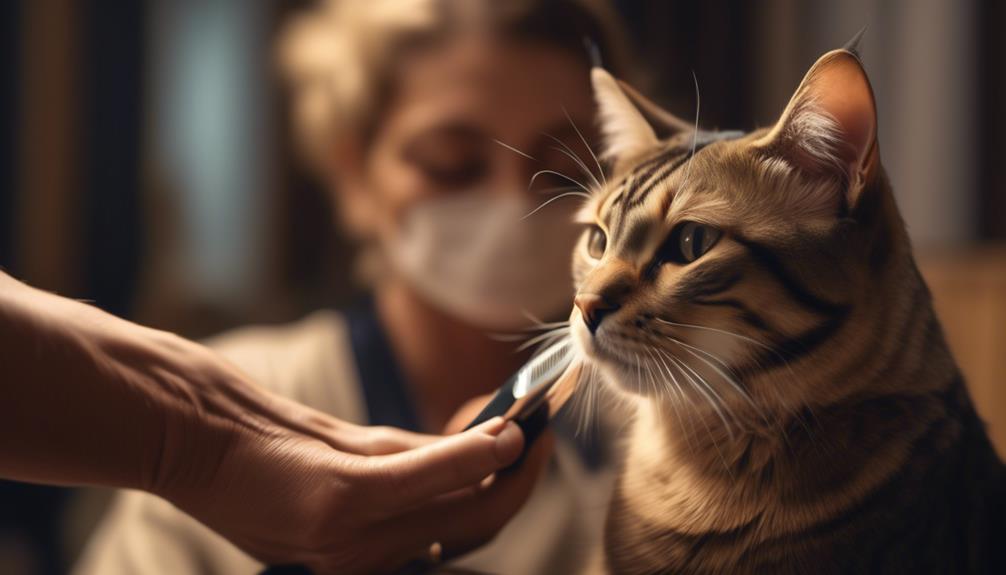
Proper health care and coat maintenance are essential to ensure the well-being of your Serengeti cat.
Serengetis are generally healthy cats with no breed-specific health problems.
However, regular wellness visits with a vet are essential to monitor their overall health.
It is crucial to watch for signs of distress or pain and stay vigilant about your cat’s well-being.
Providing enough space for your Serengeti to run and climb is essential to keep them active and prevent feline obesity.
Adding interactive toys for mental stimulation is also recommended.
Regarding coat maintenance, Serengetis has a low-maintenance coat that only requires brushing once a week.
Regular brushing helps prevent matting and hairballs. Additionally, they regularly check and trim their nails, ears, and teeth to ensure their overall hygiene.
Adaptability to Different Climates
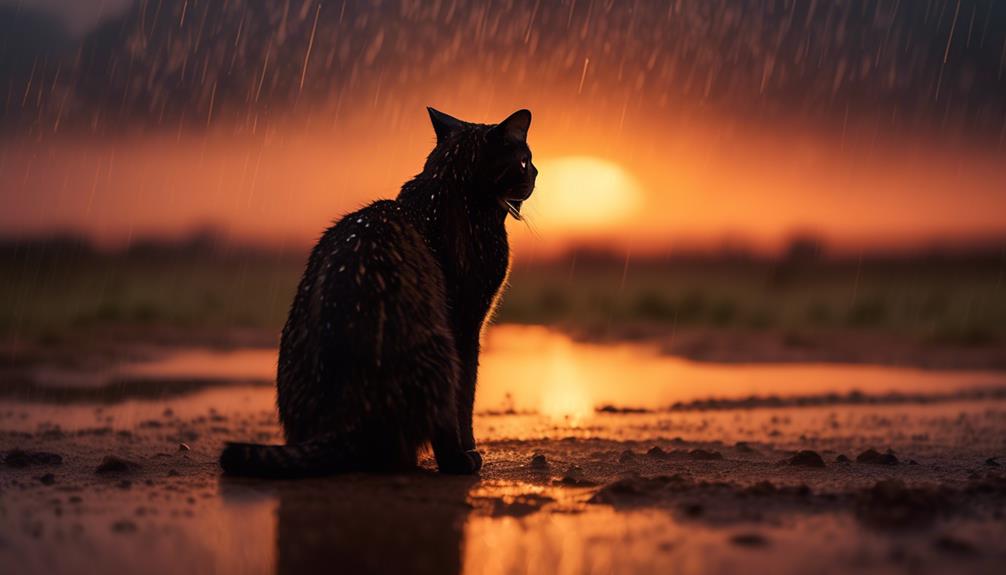
After addressing the importance of health care and coat maintenance, it is crucial to understand the Serengeti cat’s adaptability to different climates.
The Serengeti cat is known for its adaptability to various weather conditions, although it prefers slightly warmer temperatures.
Here are some key points about the Serengeti cat’s adaptability to different climates:
- The Serengeti cat can thrive in both hot and cold climates.
- They have a dense, sleek coat that provides insulation and protection against extreme weather conditions.
- Their jacket allows them to regulate their body temperature effectively.
- They enjoy basking in the sun and may even seek out warm spots in the house.
Serengeti and Children/Other Pets
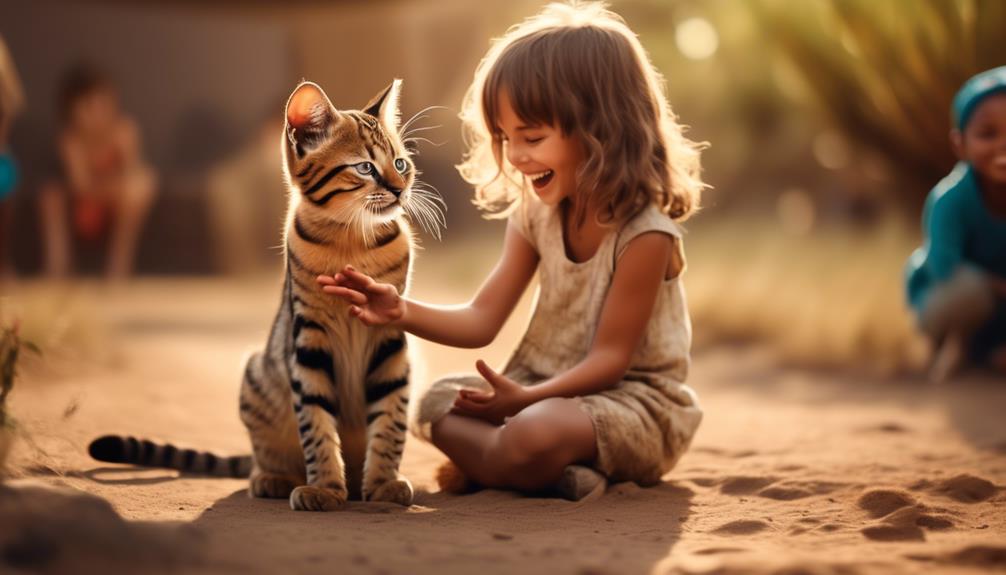
Thanks to their friendly and adaptable nature, Serengeti are well-suited for homes with children and other pets.
Early socialization and setting boundaries are essential to ensure a harmonious environment. Supervising interactions between kids and cats is crucial to prevent accidents or rough play.
Serengetis are generally tolerant and patient with children, making them an excellent choice for families.
They usually get along well with other household pets, but early socialization is critical.
Rewarding good behavior and providing positive experiences will help create a peaceful coexistence.
With their playful and affectionate personality, Serengetis can bring joy and companionship to children and other household pets.
Serengeti Rescue Groups
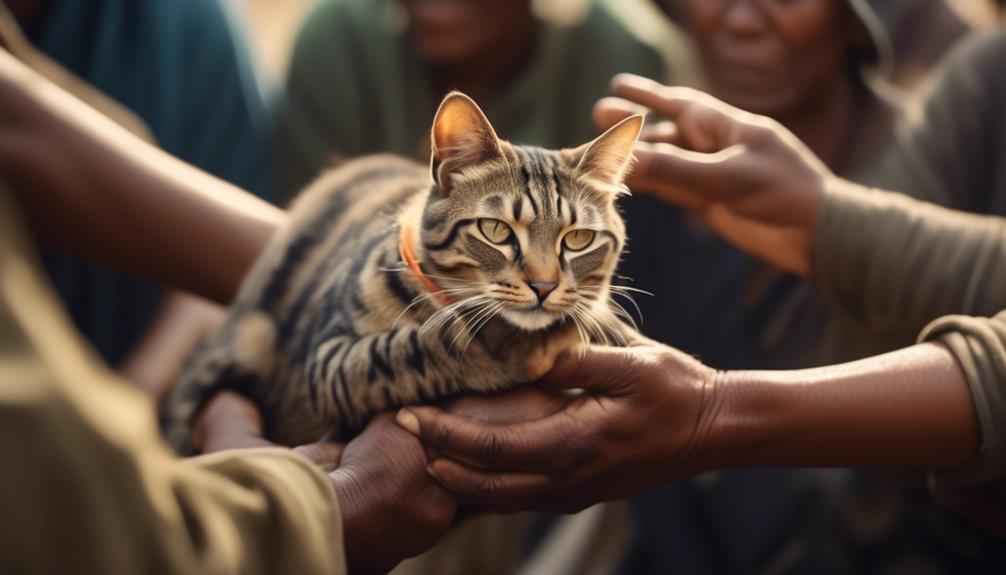
Various options are available for finding Serengeti cats through breed-specific rescues or general cat shelters.
If you are interested in adopting a Serengeti cat, here are some potential rescue groups and shelters to consider:
- Bengal or Oriental Shorthair rescues: Although breed-specific Serengeti rescues may be hard to find, Bengal or Oriental Shorthair rescues might have Serengeti cats available for adoption.
- General cat shelters: Many public cat shelters may have Serengeti cats in their care. These shelters often have various cats and mixed breeds available for adoption.
- Nonprofit rescues: Nonprofit rescues such as Great Lakes Bengal Rescue and Hope For Paws may also have Serengeti cats available for adoption.
- Best Friends Animal Society: This organization is dedicated to finding homes for all types of animals, including cats. They may have Serengeti cats available for adoption or can help you locate a rescue group specializing in this breed.
Remember to research and contact these organizations to inquire about the availability of Serengeti cats for adoption.
Additional Resources for Adoption
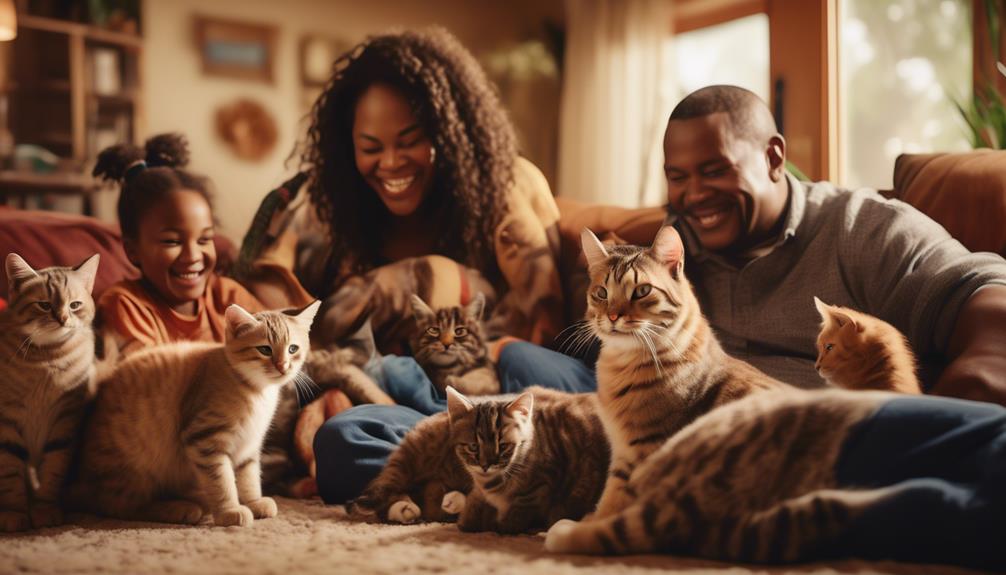
To further explore adoption options for Serengeti cats, consider utilizing additional resources that can assist in finding these unique feline companions.
While breed-specific rescues for Serengeti cats may be hard to find, it is worth checking Bengal or Oriental Shorthair rescues, as they may have Serengeti cats available for adoption.
Additionally, general cat shelters may also have Serengeti cats in their care.
Nonprofit rescues such as the Great Lakes Bengal Rescue and Hope For Paws may also be worth contacting for information on available Serengeti cats.
For a broader range of adoption options, exploring the resources provided by organizations like the Best Friends Animal Society is recommended.
These resources can help potential adopters find the perfect Serengeti cat to join their family.
Frequently Asked Questions
Are Serengeti Cats Hypoallergenic?
Serengeti cats are not hypoallergenic. While they have a low-maintenance coat, they still produce allergenic proteins in their saliva and skin.
Individuals with allergies should take precautions and consult with a healthcare professional.
How Much Exercise Do Serengeti Cats Need?
Serengeti cats require regular exercise to maintain a healthy weight and prevent boredom.
Engaging them in interactive play sessions and providing opportunities for climbing and running will help meet their exercise needs.
Do Serengeti Cats Have Any Unique Vocalizations?
Serengeti cats do not have any unique vocalizations specific to their breed.
However, like any other domestic cat, they may communicate through meowing, purring, hissing, and growling to express their needs, emotions, and desires.
Can Serengeti Cats Be Trained to Do Tricks?
Yes, Serengeti cats can be trained to do tricks. They are intelligent and easy to prepare.
They can learn tricks like sitting, rolling over, and fetching with consistent positive reinforcement and patience.
What Are the Average Adoption Fees for Serengeti Cats?
The average adoption fees for Serengeti cats can vary depending on location, age, and the specific rescue or breeder.
It is recommended to contact local rescues or breeders to inquire about their adoption fees.
Conclusion
In conclusion, the Serengeti mixed cat breed is a medium-sized domestic shorthair known for its unique spotted pattern and affectionate nature towards families.
Recognized by the International Cat Association, this breed is intelligent, easy to train, and requires weekly grooming.
While generally healthy, regular vet visits are essential.
Serengeti cats can be compatible with children and other pets, making them a great addition to any family.




